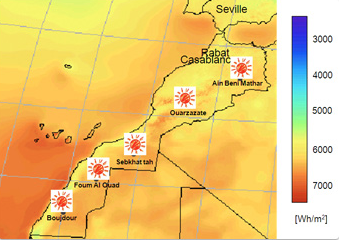In Trelew, Chubut, the students from the local Technical School have installed a new wind-solar hybrid system, capable of providing opportunity for energy self-sufficiency in the rural community.
Sustainable Energy System Transformation in Morocco
Morroco faces immense interconnected challenges with regards to its energy system, socio-economic development and climate change. Around 95% of the country’s energy supply is currently based on fossil fuel imports, which places a huge burden on both the national budget and the country’s energy security.
To achieve sustainable socio-economic development, a stable and affordable energy supply is necessary. With the Moroccan Solar Plan the government has established the first step for a transition to a more sustainable system. Part of this programme is a 160MW concentrating solar power (CSP) plant in Ouarzazate, which unlocks development and income opportunities for the local population. Meanwhile, critical aspects of the large-scale power plant, such as land and water consumption, must be carefully considered.
The project has been developed by the Moroccan Agency for Solar Energy (MASEN) which has established a social development programme for the area of Ouarzazate. As part of a public workshop, established strategies and their implementation were discussed, including potential critical aspects for the local population in order to guarantee the sustainable implementation of future CSP projects. The WISIONS team participated in this workshop.


